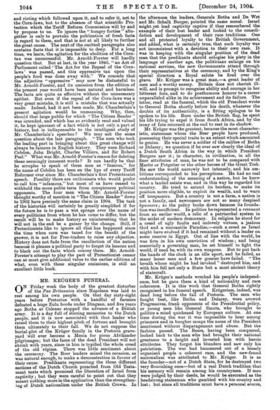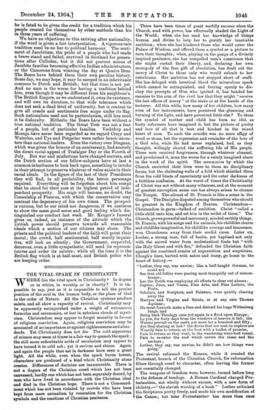the afternoon the leaders, Generals Botha and De Wet and
Mr. Schalk Burger, pointed the same moral. Israel might yet lead captivity captive if they remembered the example of their lost leader and looked to the consoli- dation and development of their race traditions. One and all protested loyalty to the British Government, and added, what is certainly true, that such loyalty was not inconsistent with a devotion to their own race. It was in keeping with the singular position of the dead man that the predikants should eulogise his piety in the language of another age, the politicians enlarge on his national services, the new Governments attend through their representatives at the ceremony, and by the King's special direction a Royal salute be fired over the grave. Mr. Kruger was a great man,—a great leader of men and a worthy enemy. Britain does not cherish ill- will, and is prompt to recognise ability and courage in her bitterest foes, and to do posthumous honour to a career unparalleled alike in its achievement and its failure. The letter, read at the funeral, which the old President wrote to General Botha shortly before his death, whatever the doubts of its authenticity, is a fitting epilogue to be spoken to his life. Born under the British flag, he spent his life trying to expel it from South Africa, and by the irony of fate returned at the end to rest in its shadow.
Mr. Kruger was the greatest, because the most character- istic, statesman whom the Boer people have produced, possessing their special traits to an extent which amounted to genius. He was never a soldier of the calibre of Botha or Delarey ; we question if he ever saw clearly the ideal of a Dutch South Africa in the way in which President Burgers saw it ; in character, in civilisation, in all the finer attributes of man, be was not to be compared with Maritz or Potgeiter or the other heroes of the Great Trek. He saw the world narrowly but intensely, and his am- bitions corresponded to his perceptions. He had no real understanding of the meaning of a nation, but he knew what a landed estate was, and in this way he regarded his country. He tried to extend its borders, to make its position more eligible, to exploit its wealth, and to warn off trespassers. But a country is not a farm, a nation is not a family, and newcomers are not so many despised bywoners ; so the policy broke down because its founda- tion was insufficient. In politics he represented a revenant from an earlier world, a relic of a patriarchal system in the midst of modern democracy. In religion he stood for a creed of ugly faults and unlovely virtues, a jealous God and a mercantile Paradise,—such a creed as Israel might have evolved if it had remained without a leader on some reserve in Egypt. Out of line with the world, he was firm in his own conviction of wisdom ; and being essentially a governing man, he set himself to fight the world, if need be, with its own weapons. But to put back the hands of the clock is an idle sport, and he failed, as many lesser men and a few greater have failed. " The breath whose might he had invoked " destroyed him, and with him fell not only a State but a most ancient theory of statecraft.
Mr. Krtiger's methods wrecked his people's independ- ence, but he gave them a kind of nationality and race coherence. It is this work that General Botha rightly recognised in his funeral speech. Krtigerism, indeed, was dead long before the fall of Pretoria. The men who fought best, like Botha and Delarey, were avowed Progressives, frank opponents of the Presidential policy, or young men like General Smuts, who brought to politics a mind quickened by European culture. At one time during the war it was impossible to hear among prisoners and in burgher camps the name of the President mentioned without disparagement and abuse. But the fashion passed. The Boers, having been conquered, looked back to the man who had brought their national greatness to a height and invested him with heroic attributes. They forgot his blunders and saw only his patriotism. The war had hammered out of a loosely organised people a coherent race, and the new-found nationalism was attributed to Mr. Kruger. It is as the founder—not of a Dutch State, for he destroyed two very flourishing ones—but of a real Dutch tradition that his memory will remain among his countrymen. If men were judged by their deeds, he would be execrated as the headstrong statesman who gambled with his country and lost ; but since all traditions must have a personal source, he is fated to be given the credit for a tradition which his people created for themselves by other methods than his in three years of suffering. We have no objections to this striving after nationality, if the word is given a fair interpretation. A vigorous race tradition need be no bar to political harmony. The senti- ment of Jacobitism, the pride of a people who had made a brave stand and failed, survived in Scotland for genera- tions after Culloden, but it did not prevent scions of Jacobite families becoming effective Indian administrators, or the Camerons from winning the day at Quatre Bras. The Boers have behind them their own peculiar history. Some day, we may hope, it may be merged in an inheritance common to Dutch and British ; but that time is not yet. And no man is the worse for having a tradition behind him, even though it may be different from his neighbour's. The British Empire, as we understand it, owes its existence, and will owe its duration, to that wide tolerance which does not seek a dead level of uniformity, but is content to give all creeds and sentiments free scope under its flag. Such nationalism need not be particularism, still less need it be disloyalty. Hitherto the Boers have been without a true national tradition. The Great Trek was not a feat of a people, but of particular families. Vechtkop and Alosega have never been regarded as we regard Crecy and Waterloo, and Uys and Potgeiter were rather heroic ances- tors than national leaders. Even the victory over Dingaan, which was given the honour of an anniversary, had scarcely the direct racial appeal of Trafalgar Day or the Fourth of July. But war and misfortune have changed matters, and the Dutch section of our fellow-subjects have at last a common inheritance to look back upon, something to invoke in their attempt to preserve whatever of value exists in their racial ideals. In the figure of the last of their Presidents they will find, in all probability, the heroic personage required. Everything will be forgotten about him except that he stood for their race at its highest period of inde- pendent prosperity. His reign will become, no doubt, the Consulship of Plancus, with which the conservative may contrast the degeneracy of his own times. The prospect is curious, but to our mind not dangerous, if we continue to show the same good sense and good feeling which dis- tinguished our conduct last week. Mr. Krtiger's funeral gives us, indeed, an instance of the attitude which the British power should preserve towards all reasonable ideals which a section of our citizens may share. The priests and the political leaders of the faith will point their moral ; the crowd, half sentimental, half merely inquisi- tive, will look on silently ; the Government, respectful, decorous, even a little sympathetic, will send its represen- tatives and- order its salutes ; while all the time it is the British flag which is at half-mast, and British police who are keeping order.



































 Previous page
Previous page